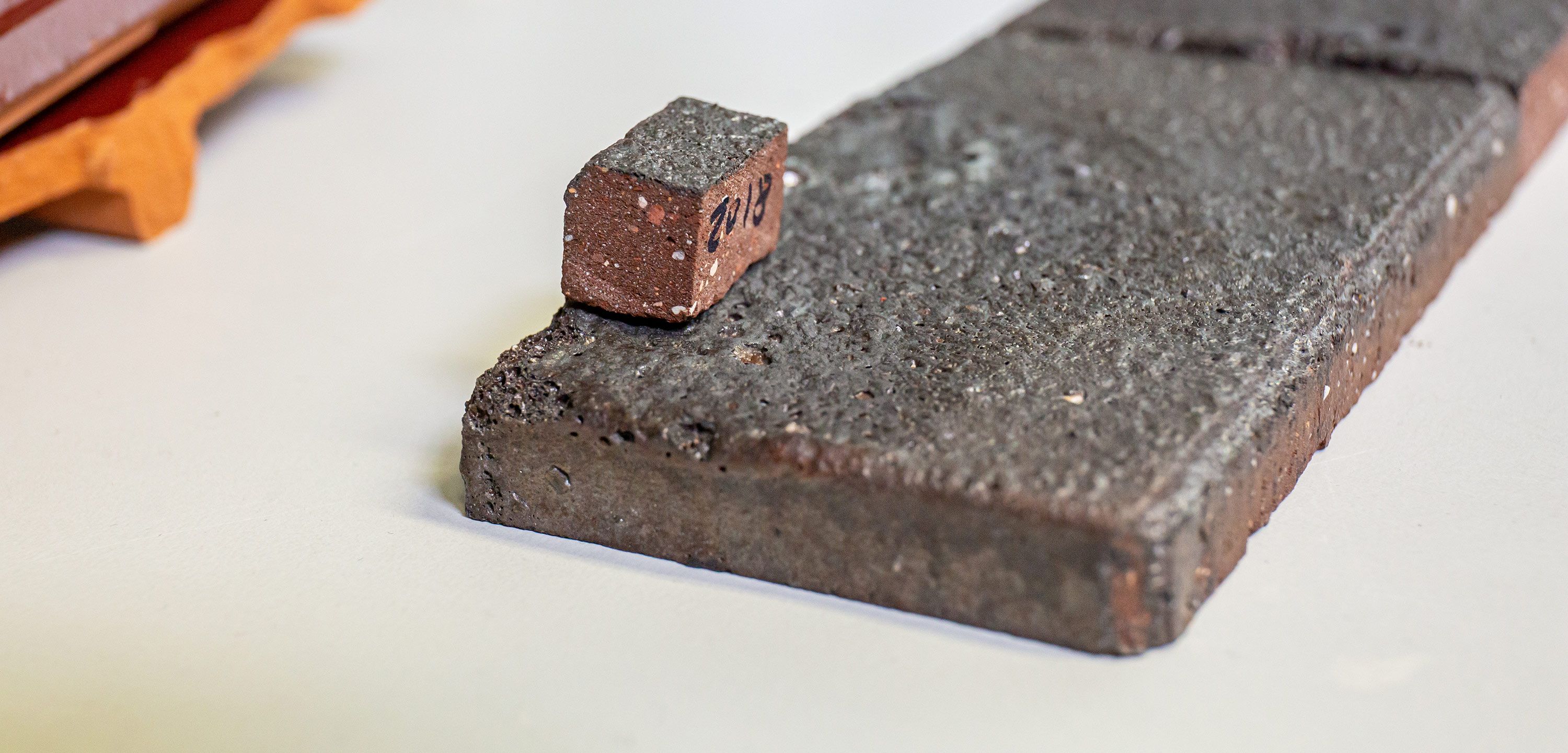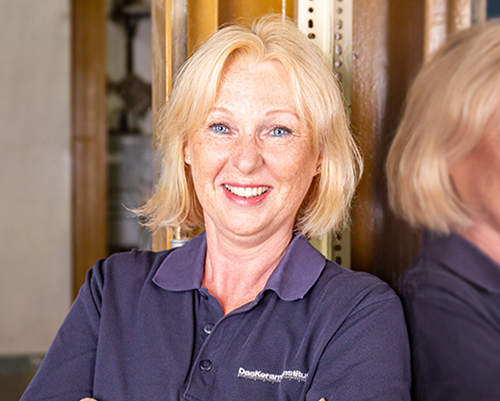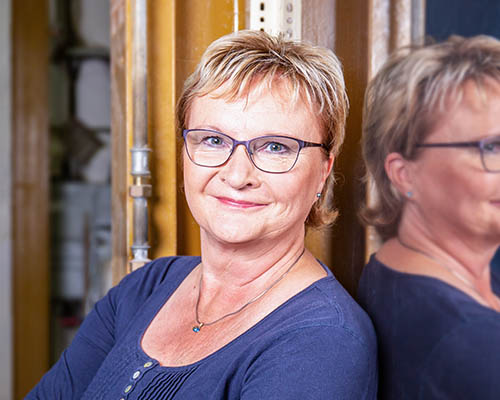
Testing of Raw and Fired Glazes
The Keramikinstitut can test the processing behaviour of raw glazes and the properties of glazed ceramic surfaces. Approved testing methods are applied.
Glaze Testing
- Determination of the Length of Flow of glazes and ceramic fluxes by a channel viscosimeter following operation instruction 18880
- Determination of the Melting behaviour with Heating Microscope and Dilatometer Analyses
- Glazing Stress Test according to Steger (qualitative)
- Scratch Hardness Test according to Mohs (old: DIN EN 101)
- Determination of the Glaze Abrasion Resistance; sprinkling method with corundum K63 (it corresponds to grain 24 following DIN) following operation instruction 18881 (10 pieces)
- Determination of the Glazes Crazing Resistance under hydrothermal conditions (autoclave test) following operation instruction 37160 and DIN EN ISO 10545-11
- Determination of the Moisture Expansion of hydrothermal stress
- test piece preparation
- autoclave test
- determining moisture expansion
- Color Measurements and Degree of Witheness
- Gloss Measurements on flat surfaces
Remission measurement with 3 angles following testing station instruction 103
- Determination of the Contact Angle for a review of the wetting ability of glazes at room temperature with the stereo microscope Stemi 2000
Tile and Plate Testing
The Keramikinstitut can test the performance characteristics of ceramic tiles and plates according to the requirements of DIN EN 14411. Approved testing methods are applied.
Tile and Plate Testing
- Determination of dimensions and Surface Characteristics of tiles and plates following DIN EN 10545-2
- Determination of the Water Absorption of tiles and plates following DIN EN ISO 10545-3
- Determination of the Drying Bending Strength of wall and floor tiles following DIN EN ISO 10545-4
- Determination of the Bending Strength after Firing of wall and floor tiles following DIN EN ISO 10545-4
- Determination of the Scratch Hardness Test according to Mohs (old: DIN EN 101)
- Determination of the resistance against Surface Abrasion of glazed tiles und plates following DIN EN ISO 10545-7 (8 pieces à 10 x10 cm2)
- Determination of the Linear Thermal Expansion of ceramic tiles and plates following DIN EN ISO 10545-8
- Determination of the Thermo Shock Resistance of ceramic tiles and plates following DIN EN ISO 10545-9
- Determination of the Moisture Expansion of ceramic tiles and plates following DIN EN ISO 10545-10
- Measurement of Resistance against Glaze Cracks of ceramic tiles and plates following DIN EN ISO 10545-11
- Determination of Frost Resistance of ceramic tiles and plates following DIN EN ISO 10545-12
- Chemical Resistance of ceramic wall tiles and plates following DIN EN ISO 10545-13
- Resistance against Specking of ceramic wall tiles and plates following DIN EN ISO 10545-14
- Determination of the solubility of lead and cadmium following DIN EN ISO 10545-15
- Determination of slip resistant properties following DIN 51130
Roofing Tile Testing
The Keramikinstitut can test the performance characteristics of roofing tiles. Approved testing methods are applied.
Roofing Tile Testing
- Determination of Frost Resistance of roofing tiles and roofing tiles accessories following DIN EN 539-2, frost acts on all over after impregnation in vacuum
- Water impermeability of roofing tiles following DIN EN 539-1
- Determination of Water Soluble Salts (elution method), (old: DIN 51110)
- Determination of Floating Enclosures (steam test) (old: DIN 105-1)
- Abrasive wear test according to Böhme following DIN 52108
- Loss of volume
- Loss of thickness
- Determination of Moisture Expansion with the dilatometer after hydrothermal treatment
- Determination of the Crazing Safety of glazed structural ceramics in the autoclave
- Determination of UV-Resistance / Light Stability of glazed structural ceramics accomplishing cyclic stress with UV radiation and sprinkling
- Determination of Weathering Resistance of glazed structural ceramics to moisture and temperature in the climate chamber
- Determination of the Resistance of Surfaces to Boiling Water and Water Vapour following DIN ISO 28706-2 by using a tester as described in DIN ISO 2733
- Measurement of Geometrical Properties of roofing tiles following DIN EN 1024
- Determination of the Bending Loading Capacity of roofing tiles following DIN EN 538
- Determination of the Leaching Behaviour (chemical resistance) of glazed roofing tiles following DIN EN ISO 28706-2 (old: DIN EN 14483-2)
Brick and Clinker Brick Testing
The Keramikinstitut can test the performance characteristics of bricks and clinker bricks according to DIN requirements. Approved testing methods are applied.
Brick and Clinker Brick Testing
- Determination of Water Soluble Salts (elution method or percolation method) (old: DIN 51100)
- Determination of Floating Enclosures (steam test) following DIN EN 771-1
- Determination of the Acid Resistance depending on the use,
- Following DIN EN ISO 10545-13; bricks
- Following DIN 51102-1;sewerage stoneware
- Following DIN EN 993-16; for example ceramic clinker for acid protective building
- Following DIN 4051; sewer brick
- Abrasive Wear Test according Böhme, following DIN 52108
- Determination of the loss of volume
- Determination of the loss of thickness
- Determination of the Moisture Expansion with the dilatometer after autoclave treatment
- Determination of the Crazing Safety of glazed structural ceramics in the autoclave
- Determination of the UV-Resistance / Light Stability of glazed structural ceramics by means of cyclic stress with UV radiation and sprinkling
- Determination of Weathering Resistance of glazed structural ceramics to moisture and temperature in the climate chamber
- Determination of the Resistance of Surfaces to Boiling Water and Water Vapour following DIN ISO 2744 by using a tester following DIN ISO 2733
- Determination of the Compression Strength of solid bricks and hollow bricks
- Measurement of Geometrical Properties following DIN EN 771-1
Paving Brick and Clay Paver Testing
The Keramikinstitut can test the performance characteristics of paving bricks and clay pavers. Approved testing methods are applied.
Paving Brick and Clay Paver Testing
- Determination of Water Soluble Salts (elution method) (old: DIN 51100)
- Determination of Floating Enclosures (steam test) following DIN EN 105-100
- Determination of the Acid Resistance depending on the use,
- Following DIN 51102-1;sewerage stoneware, in lumps
- Following DIN EN 993-16; for example ceramic clinker for acid protective building, grained
- Following DIN EN 1344; paving bricks
- Following DIN 4051; sewer brick, grained
- Abrasive Wear Test according to Böhme, following DIN 52108
- Determination of the loss of volume
- Determination of the loss of thickness
- Determination of the Moisture Expansion with the dilatometer after autoclave treatment
- Determination of the Crazing Safety of glazed structural ceramics in the autoclave
- Determination of the UV-Resistance / Light Stability of glazed structural ceramics by means of cyclic stress with UV radiation and sprinkling
- Determination of Weathering Resistance of glazed structural ceramics to moisture and temperature in the climate chamber
- Determination of the Resistance of Surfaces to Boiling Water and Water Vapour following DIN ISO 2744 by using a tester following DIN ISO 2733
- Determination of the Bending Loading Capacity following DIN EN 1344 as the bending tension load and the Compression Strength following DIN 18503
- Determination of the Water Absorption following DIN 18503
- Determination of the Water Impermeability (coefficient of permeability) following guideline for water permeable paving bricks of featuring no fines concrete
- Measurement of Geometrical Properties following DIN EN 1344
Granular Material Testing
The Keramikinstitut can test the performance characteristics of ceramic granular materials according to DIN requirements. Approved testing methods are applied.
Granular Material Testing
- Test Sieving following DIN 66165, part 1 and 2; max. 7 screen cuts
- Determination of the Trickling Behaviour of granular following testing station instruction 84
- Determination of the Bulk Density, following DIN EN 1097-3
- Determination of the Abrasion of granules following testing station instruction 83
Fine Ceramics Testing
The Keramikinstitut can test the performance characteristics of fine ceramic products, especially of tableware. Approved testing methods are applied.
Fine Ceramic Testing
- Determination of the Thermal Shock Resistance of fine ceramics (table porcelain) following operating instruction 18877 (Harkort-test)
-
Determination of the Dishwasher Safety of decorated table porcelain
Following DIN EN 12875-1 with testing dishwasher (G540 Miele) -
Determination of the Acid Resistance / Pollutant Emission of lead and cadmium following DIN EN 1388-1
- Cold acidification
- Hot extraction
- Lead determination
- Cadmium determination
- Scratch Hardness Test according to MOHS (old: DIN EN 101)
- Determination of the Crazing Safety of dishes after hydrothermal treatment
Refractory Testing
The Keramikinstitut can test the performance characteristics of ceramic refractory materials. Approved testing methods are applied.
Refractory Testing
- Determination of the Bulk Density, Open Porosity and True Porosity following DIN EN 993-1
- Determination of the Cold Compression Strength in accordance with DIN EN 993-5
- Determination of the Bending Strength at room temperature in accordance with DIN EN 993-6
- Determination of the Bending Strength at elevated temperature in accordance with DIN EN 993-7
- Determination of the Pressure Flow following DIN EN 993-9
- Abrasive Wear Test according to Böhme (DIN 52108)
- Determination of the Thermal Shock Resistance of refractory bricks following DIN 51068 (water quenching method) and DIN EN 993-11
- Determination of the Post Shrinkage / Secondary Expansion following DIN EN 1094-6 (old: DIN 51066, Part 1und 2) and DIN EN 993-10
- Determination of the Bulk Density of Granular Material according to the mercury displacement technique following DIN 993-17
- Determination of the Oxidation Resistance of 3 samples to 950°C by steam atmosphere, according to ASTM C 863-83
- Determination of the Si3N4, quantitatively by means x-ray diffraction (XRD)
- Determination of the Silicon in silicon carbide, quantitatively by X-ray diffraction analysis
- Determination of the pyrometric cone equivalent following DIN EN 993-12
- Determination of Thermal Conductivity according to DIN EN 993-14/15



